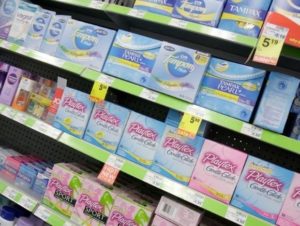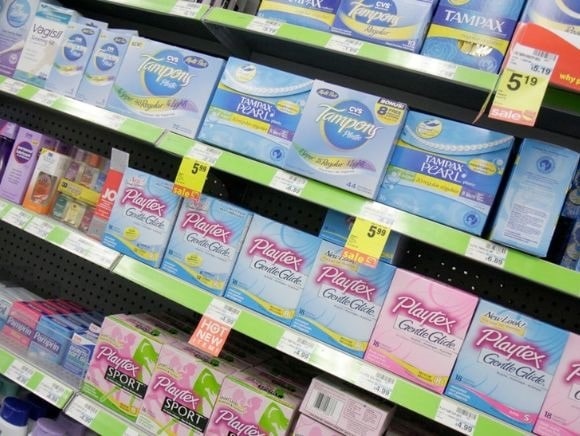Everywhere consumers look, there is a shortage of goods and services: baby formula, fertilizer, potatoes, Sriracha hot sauce, toilet paper, and objective, reliable journalists at CNN. Women – and only women – can add tampons to the growing list of products difficult to find at the local supermarket, drug store, and back alleyway in this chaotic post-pandemic economy. What was once just social media anecdotes has turned into an industry reality. While the supply chain snafus are rearing their ugly heads again, one tampon manufacturer is blaming alleged comedian Amy Schumer for the shortages.
What’s the Deal with Tampons?
[substack align=”right”]It looks like the U.S. marketplace is smack dab in the middle a good old-fashioned catfight on aisle seven at the nearest Walgreens, as these essential items might be scarce during the Moon’s next cycle.
Procter & Gamble, the maker of Always and Tampax, confirmed that demand had risen nearly 8% over the last couple of years, citing supposed actress Amy Schumer and her campaign to promote positive discussions and erase the stigma surrounding menstrual health. This prompted the symbol of third-wave feminism to tweet that she was not responsible for the shortages because she does not possess a uterus anymore after she had it removed due to suffering from endometriosis. Schumer ostensibly missed the memo that men can also have periods, but that is a different science-fiction tale for another day.
But while it is easy to poke fun at the legendary thespian for today’s woes, it is a rather elementary case of supply, demand, and price inflation. Period.
Indeed, demand has exceptionally risen since the start of the coronavirus pandemic. However, tampons maintain inelastic demand since female customers will always purchase this product because it is imperative. The underlying issue facing companies selling critical feminine care products is the challenge of sourcing the raw materials necessary to manufacture these items.
Producers of the critical feminine care product cannot source the raw materials necessary to manufacture these items. As a result, the costs of these components, mainly paper and plastic, have become increasingly expensive, too. Paper costs have spiked 25% year-over-year, while plastic has increased close to 10%. Moreover, shipping delays have become a key facet of the supply chain crisis, so corporations struggle to receive their orders on time and restock the shelves.
Of course, not every brand is facing the same supply chain woes. Kimberly Clark, the owner of Kotex, confirmed that it has yet to endure product shortages in the US, adding that it works “closely with our retail partners to keep shelves stocked, and U by Kotex® remains on-track to donate more than 6 million period supply products to the Alliance for Period Supply this year in efforts to help fight period poverty.”

(Photo by: Jeffrey Greenberg/Universal Images Group via Getty Images)
Still, for something that 40% of the US population requires, women are feeling the pain in their wallets. Over the last year, tampon prices have soared by 9.8%, while menstrual pad costs have skyrocketed by 8.3%. Market experts anticipate that tampon prices will continue to rise heading into 2023. Put simply, prices are merely responding to the shortages and latest developments in the economy.
Of course, this did not stop TIME Magazine from accusing the marketplace and the supply chain crisis of sexism, writing that “no one’s talking about” the tampon shortages. “Many women speculated that if men had to breastfeed, there would be no formula shortage,” the publication wrote.
The Everything Shortage Economy
Parents cannot find hypoallergenic formula for their children. Restaurants serving Thai food cannot find the spicy and delicious sauce. Grocery stores will simply have to lettuce wait to make a salad. Fewer at-home chefs will shed tears as onions are becoming scarcer. Swimming pools will have fewer lifeguards. But children will be celebrating now that there has also been a disruption in the output of broccoli, cucumbers, spinach, and zucchini. Now, if there could only be a shortage of politicians, the United States – and the world – would be a better and perhaps a more affordable place.




